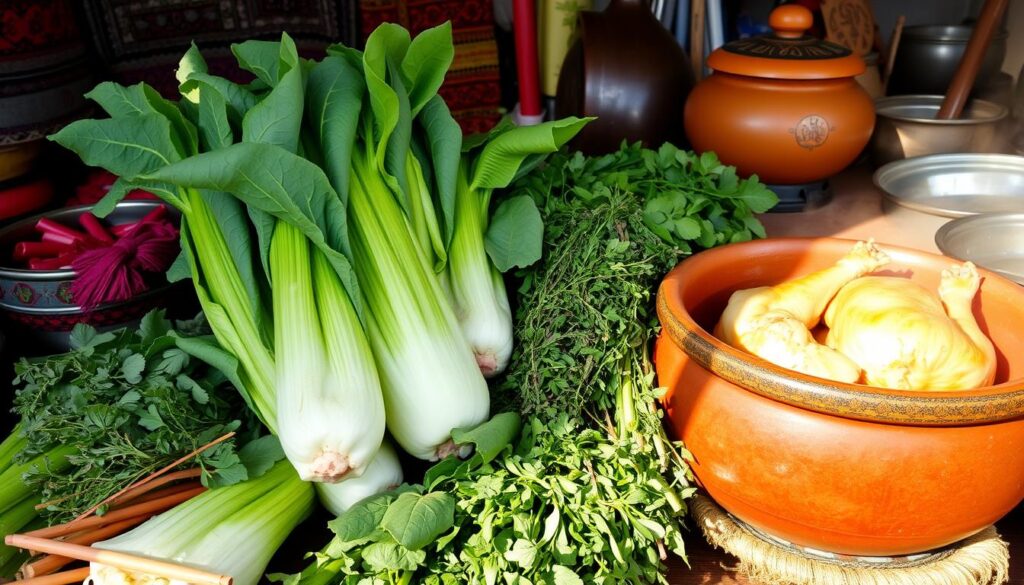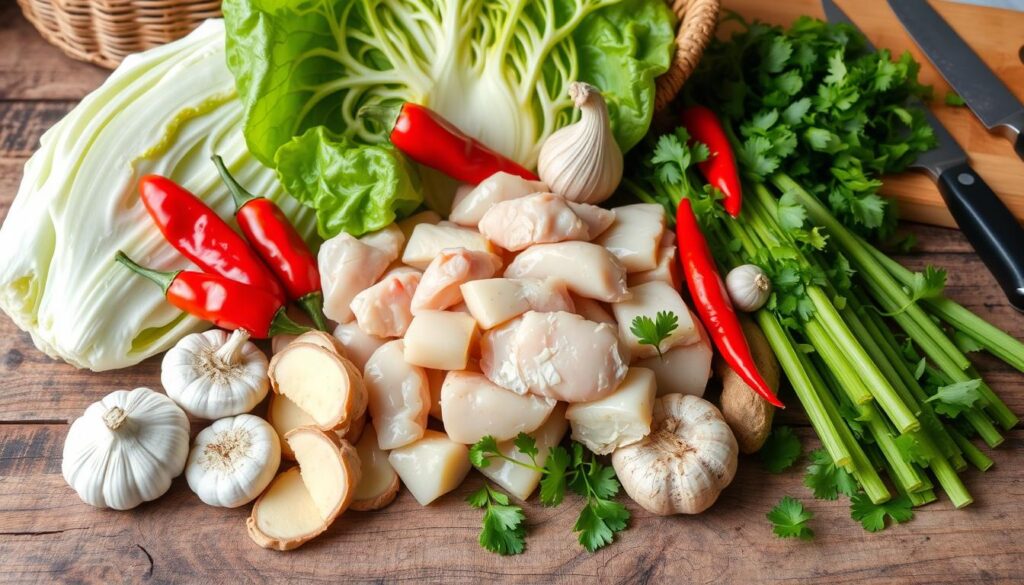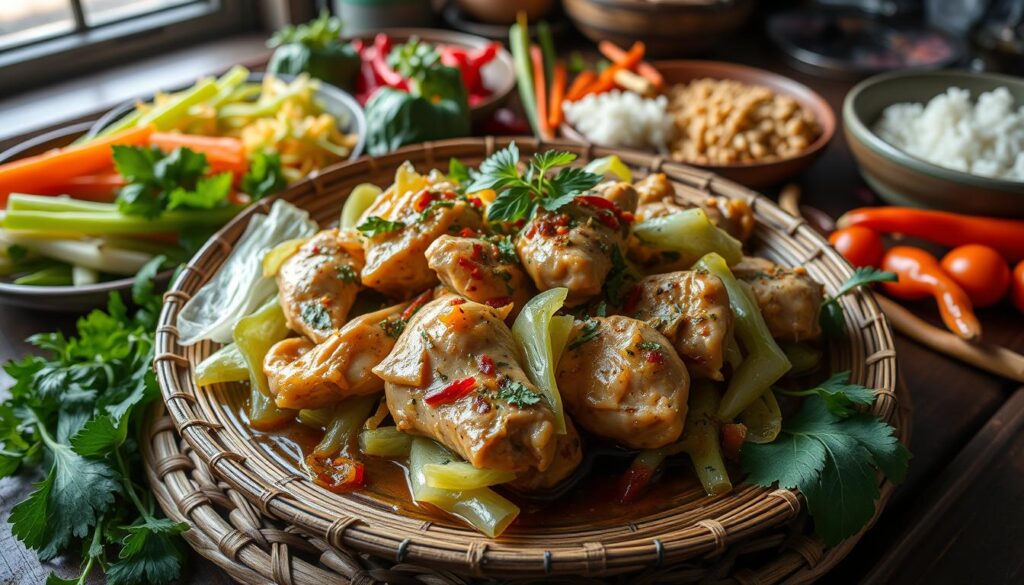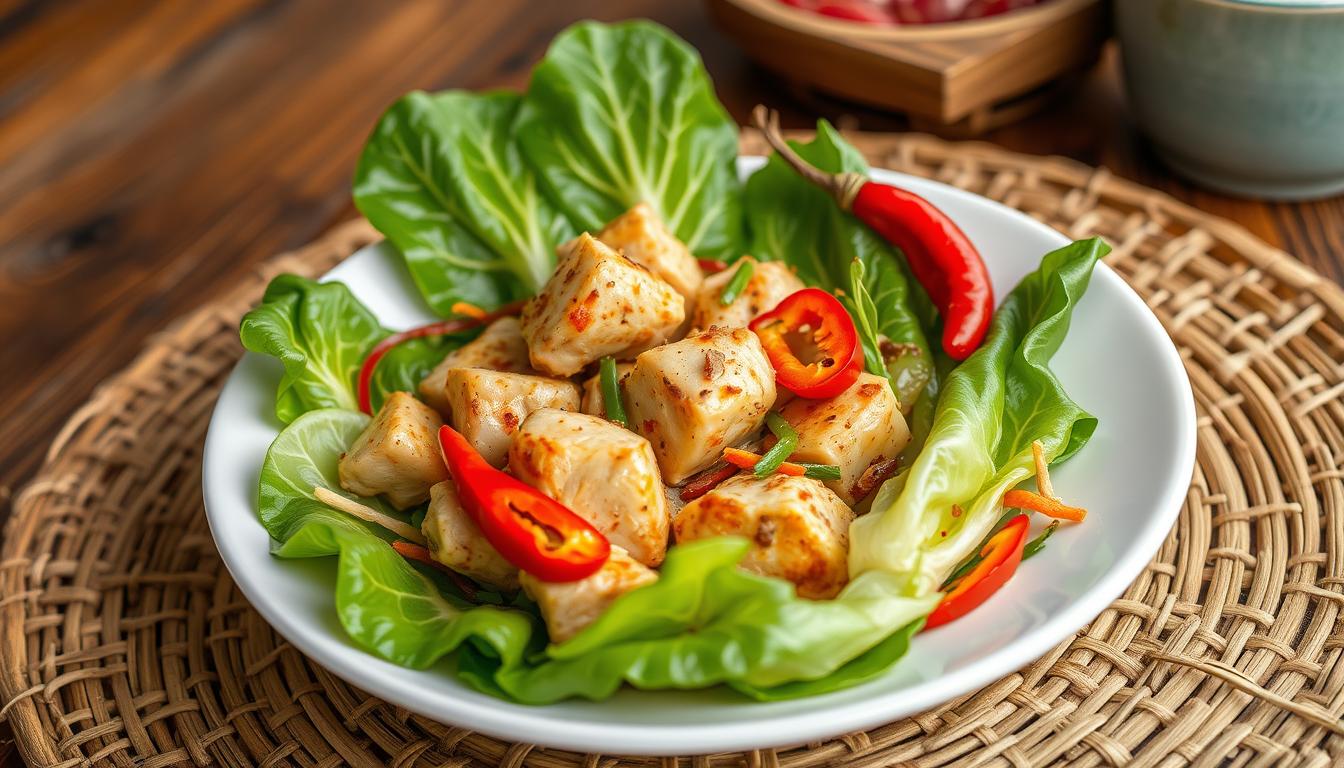The smell of sizzling ginger and garlic takes me back to Southeast Asia’s lively markets. The Hmong cabbage and chicken dish is a journey of flavors and traditions. It’s a story of resilience and the power of food to unite people.
If you love cooking or are new to Asian dishes, try this Hmong cabbage and chicken recipe. It’s a mix of tender chicken, crunchy cabbage, and fragrant herbs. It’s easy to make and brings the heart of Hmong cooking into your home.
Table of Contents
Understanding the Cultural Heritage of Hmong Cuisine
The Hmong Cabbage and Chicken Recipe is deeply rooted in the rich cultural heritage of the Hmong people. It comes from Southeast Asia. Hmong cuisine shows their resourceful and flavorful cooking style, using fresh, seasonal ingredients. This dish is very important, showing unity and hospitality in the Hmong community.
Origins and Traditional Significance
The Hmong Cabbage and Chicken Recipe shows the Hmong people’s resilience and adaptation. They used what they had to make nourishing meals. This dish uses common ingredients like cabbage and chicken to make a delicious Hmong dish.
The Role of Fresh Ingredients in Hmong Cooking
Hmong cuisine values fresh, high-quality ingredients. The Hmong Cabbage and Chicken Recipe is a great example. It combines flavors from garlic, ginger, shallots, fish sauce, soy sauce, chili peppers, and lime. These fresh, aromatic ingredients make the dish taste authentic and nutritious.
Modern Adaptations of Traditional Recipes
Even though the Hmong Cabbage and Chicken Recipe stays true to traditional Hmong cooking methods, new versions have come out. These changes might include different ingredients or cooking ways. But they still keep the heart of Hmong cuisine and its cultural food heritage. These changes show how Hmong cuisine is evolving, loved by new generations.

“Hmong cuisine emphasizes fresh, whole foods contributing to its health-conscious nature; cabbage, as a key ingredient in dishes, adds nutritional value.”
Essential Ingredients and Kitchen Tools for hmong cabbage and chicken recipe
To make a real Hmong cabbage and chicken dish, you need a few key things. Chicken, fresh green cabbage, and sauces like fish and soy sauce are at the core. You also need garlic, onion, and ginger for flavor.
For extra flavor, add mushrooms and carrots. These make the dish more complete and healthy. You’ll need a wok or big skillet for stir-frying. Also, a sharp knife, cutting board, and mixing bowl for prep.
A mandoline slicer helps make thin cabbage shreds. A meat thermometer ensures the chicken is cooked right. This recipe is flexible. You can swap chicken for tofu or Napa cabbage for green cabbage to fit your diet.
- Chicken (thighs or breasts)
- Green cabbage
- Fish sauce
- Soy sauce
- Garlic
- Onion
- Ginger
- Optional: Mushrooms, carrots
| Kitchen Tools | Benefits |
|---|---|
| Wok or large skillet | Essential for proper stir-frying |
| Knife and cutting board | For prepping ingredients |
| Mixing bowl | For marinating and mixing |
| Mandoline slicer (optional) | Achieve thin, consistent cabbage shreds |
| Meat thermometer (optional) | Ensure chicken is cooked to perfection |
With these ingredients and tools, you’re ready to make a tasty Hmong cabbage and chicken dish. It’s a way to honor the rich culture of Hmong cuisine.

Preparation and Cooking Techniques
Learning to make Hmong cabbage and chicken starts with getting your ingredients ready. First, clean and chop the cabbage into thin slices. Then, cut the chicken into small pieces, making sure they’re all the same size for even cooking.
Marination and Seasoning Methods
To give the chicken real Hmong taste, marinate it in soy sauce, salt, and black pepper. Let the chicken sit for 15 to 60 minutes. This lets the flavors soak into the meat.
Step-by-Step Cooking Instructions
- Heat a big skillet or wok over high heat and add some oil.
- Sauté minced garlic and ginger until they smell great.
- Put the marinated chicken in the pan and sear it until it’s golden.
- Add the sliced cabbage and stir-fry until it’s tender but still crisp.
- Season with soy sauce, fish sauce, or a bit of water to make a tasty sauce.
- Adjust the seasoning with salt, pepper, or sugar if needed.
- Cook for 20 to 30 minutes, until the chicken is done and the veggies are tender.
- Finish with fresh herbs like cilantro or green onions for a bright touch.
The secret to a great Hmong cabbage and chicken dish is using high heat and quick cooking. Also, balance the flavors with savory, salty, and sweet notes. By following these steps, you can make a healthy, flavorful meal that honors Hmong cuisine.

Nutritional Benefits and Health Considerations
The Hmong cabbage and chicken recipe is a healthy choice. Cabbage is full of fiber, vitamins C and K, and antioxidants. These help your digestive and immune systems. Chicken adds lean protein and essential B vitamins, important for muscles and energy.
This dish is low in calories but high in protein. It’s great for those watching their weight. Garlic and ginger add to its health benefits. They have anti-inflammatory properties that fight body inflammation.
The Hmong cabbage and chicken recipe is a nutrient-dense meal. It supports clean eating and overall health. It’s a tasty and healthy option for a healthy chicken recipe, savory cabbage dishes, or nutritious ethnic food.
Cabbage, a key ingredient in this dish, is packed with fiber, vitamins C and K, and antioxidants, all of which support digestive and immune system health.
Conclusion
The Hmong cabbage and chicken recipe is a tasty journey into authentic Hmong cuisine. It’s simple, nutritious, and carries deep cultural meaning. By making this dish, you celebrate the Hmong people’s rich culinary tradition.
This recipe is great for any meal, from family dinners to special events. It mixes old cooking ways with new, creating a dish full of flavor and health benefits. The lean chicken, nutritious cabbage, and Hmong spices work together beautifully.
Every bite takes you to the lively Hmong communities, where this recipe has been loved for ages. By trying this hmong cabbage and chicken recipe, you enjoy a delicious meal and help keep the cultural food heritage alive. It’s a chance to explore authentic ethnic flavors and spark your cooking adventures.

